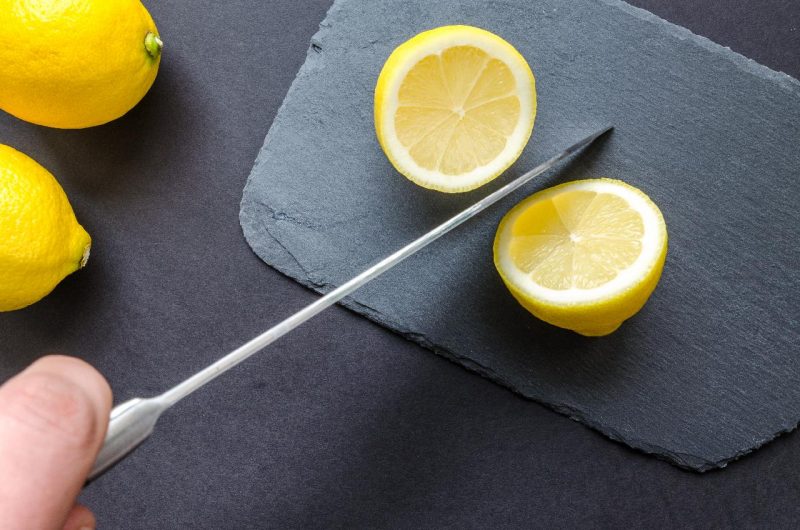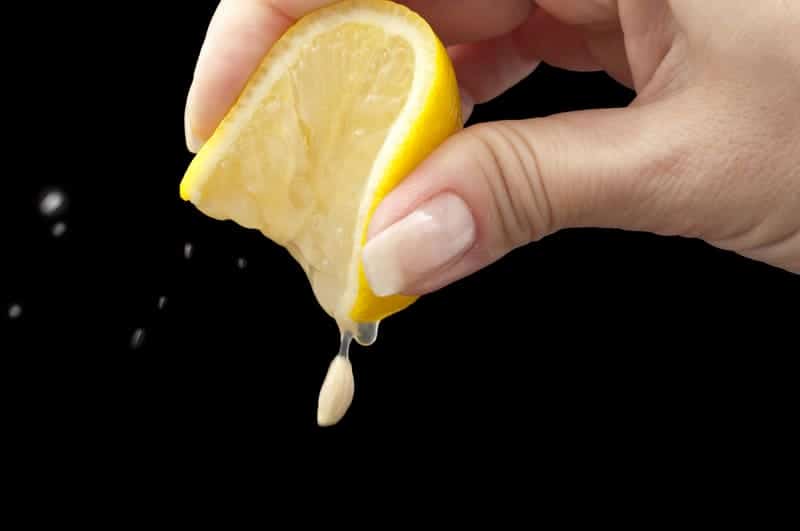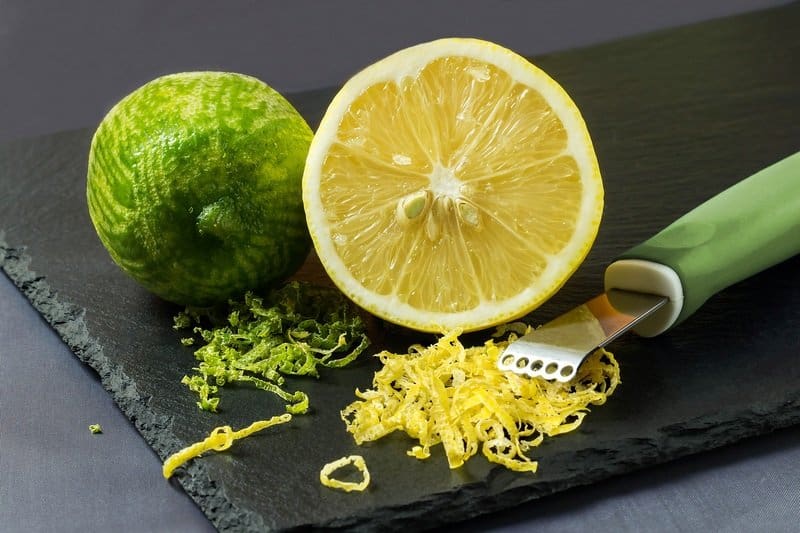Lemon is a popular citrus ingredient used in various dishes.
Chefs either incorporate the tartness of lemons in the form of juice or extract! But, keep in mind that both are not the same.
Now, this brings us to question the differences between lemon extract and lemon juice. So, what is the difference between lemon extract and lemon juice?
Simply put, lemon juice is the liquid from the fruit flesh, while the extract comes from the skin. The process of getting lemon extract is much more complicated than lemon juice.
In this guide, we’ll cover the differences between these two in detail. So, read on!
What is a Lemon Extract?
First, let’s understand what lemon extract is.
The lemon taste exists strongly in a lemon extract. Since peels are the main contributors to lemon extract, the liquid is always in a concentrated form.
Bear in mind that the lemon extract has a combination of both lemon oil and alcohol. So, when you’re using lemon extract in food recipes, only a teaspoon or two can do the trick.
Sometimes, the extract is stored in bottles and preserved for long-term use.
Moreover, it is a fantastic and handy substitute for freshly extracted lemon juice. But, the lemon extract is sweeter than lemon juice and is not the best agent in all dishes.
For instance, lemon juice is a suitable option to get a fresh earthy flavor.
Lemon Extract vs Lemon Juice: Comparison Chart
The table below gives a brief idea about the differences between lemon extract and lemon juice.
| Category | Lemon Extract | Lemon Juice |
| Definition | Taken from the skin with the addition of alcohol or oil | Raw juice extracted from fruit directly |
| Taste | Sweetened liquid with the tartness | Highly acidic with the tartness |
| Preparation | Difficult and time-consuming | Easy |
| Storage | Stays fresh when stored properly | It dries out when stored for long |
| Uses | Baked goods, entrees, and side dishes
Household products for scent |
Baked goods, jams, jellies, cocktails, lemonades, garnish |
| Ingredients | Lemon peels and alcohol or oil | Whole lemons |
Is There a Difference Between Lemon Extract and Lemon Juice?
Lemon juice and lemon extract are different in terms of taste and preparation. However, you can use either of them based on your requirements, availability, and storage.
It’s still good to know the variations between them, so you can judge which one is more suitable for a particular dish.
Taste
Lemon juice gives a pleasant citrusy taste when you consume it raw. Hence, the acidity is high in comparison to lemon extract here.
Also, lemon juice is never sweet without the addition of sweetening agents like sugar or honey. Due to this reason, it is the best option in cuisines and dishes where you require tartness.
On the other hand, lemon extract is a concentrated liquid form of the peels taken with the help of oil and alcohol. After careful making, the citrus flavor of lemons stays intact without the noticeable acidity and tartness that you get from freshly squeezed lemon juice!
Uses
Both lemon juice and extract have different functions.
Lemon juice helps prepare lemonade which is one of the best summer drinks. Also, fresh lemon juice is a must-add ingredient in many baked recipes and desserts to get the light finish to a meal.
There are many sauces prepared with lemon juice to complement the cooking of poultry or fish too. Additionally, the secret ingredient to give a structure to jams and jellies is lemon juice!
On the other hand, lemon extract also finds its place in baked goods and desserts.
For instance, short-bread cookies and pound cakes taste heavenly with lemon extract. Plenty of side dishes also have lemon extract as a key component.
Additionally, the lemon extract finds its use for the stunning scent it delivers! Most of the scented goods carry lemon extract for a fresh and soothing smell.
Note that juices do not taste good or earthy when you substitute lemon extract for lemon juice.
Preparation
Lemon extract and lemon juice have different preparation methods. Also, lemon extract takes more time to prepare compared to lemon juice.
Lemon juice recipe
The steps to prepare lemon juice are pretty simple.
- Choose a fresh lemon, roll it with your hands on a surface to get the most juice out of it.
- Then, cut it open and squeeze it with your hands into a cup.
- You can remove the seeds by filtering the liquid.
- Finally, use this lemon juice in whatever way you like!
Lemon extract recipe
Making lemon extract takes a lot of time. You need to follow a few steps as given below.
- First, choose fresh and clean lemons.
- Then, a peeler or a device to take off lemon zest is a perfect choice.
- Shred the skins into thin strips and put them in a transparent jar.
- The next step is to combine alcohol with the skins. You can choose to use any alcohol or oil of your choice.
- Vodka is the most popular option for obtaining a flavorful lemon extract.
- Pour the alcohol or oil into the jar and shake well.
- Store it away from the sun in your cabinets.
- Take it out often to give a nice good shake. You will begin to notice the concentrated liquid forming.
- If you are satisfied with the formation, strain it into another jar for storage and use.
Keep in mind that this method takes at least 4-6 weeks.
How Much Lemon Juice Equals a Lemon Extract?
Lemon extract is in concentrated form, and the ratio with lemon juice is not equal.
For general uses, one teaspoon of lemon extract equals two tablespoons of lemon juice. If the ratio is off, the dish’s taste goes out of balance.
Can You Substitute Lemon Extract for Fresh Lemon Juice?
Yes, you could use lemon extract instead of lemon juice in places where acidity and tartness do not play a crucial role.
However, the extract is not the best option in recipes that require lemon juice for acidity. You could still go ahead and add lemon extract along with vinegar to even out the tartness and acidity.
Lemon Extract vs Lemon Zest: What’s the Difference?
Lemon zest is the raw form of lemon extract. You can shave the peels off fresh lemons and use them in food. Also, they do not give any acidic taste.
Note that lemon zest is the best substitute for lemon extract in case of emergencies. The extract is in liquid form, but the zest shreds are non-liquid!
Related Questions
What is the lemon extract for?
Lemon extract is perfect for frosting, muffins, pies, cakes, fish, and poultry marinades.
Is lemon extract necessary?
Lemon extract is a great addition to many baked recipes that give the lemon taste minus the acidity. While it takes time to prepare, you can use substitutes like lemon peels, zest, and lemon oils in recipes. Lemon extract is not necessary for all cuisines as the replacements work just fine!
Can you substitute lemon extract for lemon zest?
You can use lemon extract instead of lemon zest. For each teaspoon of lemon zest in the recipe, half a teaspoon of lemon extract is the correct ratio.





